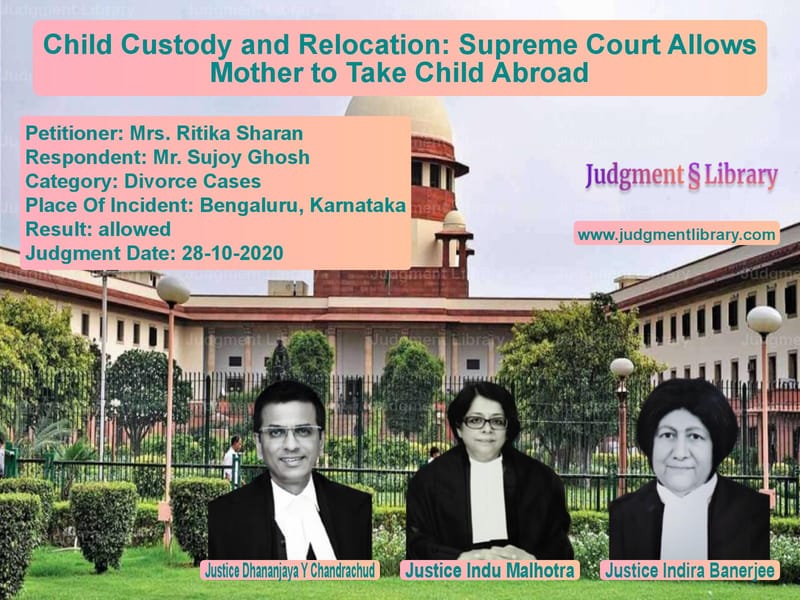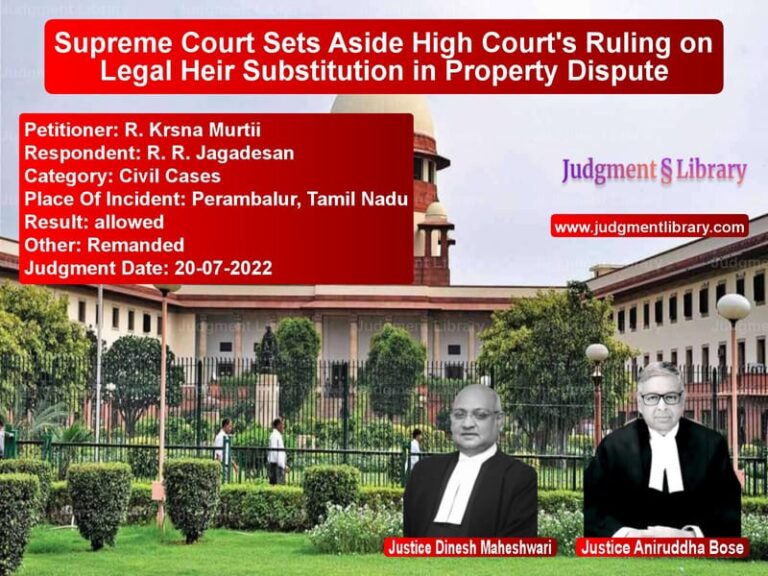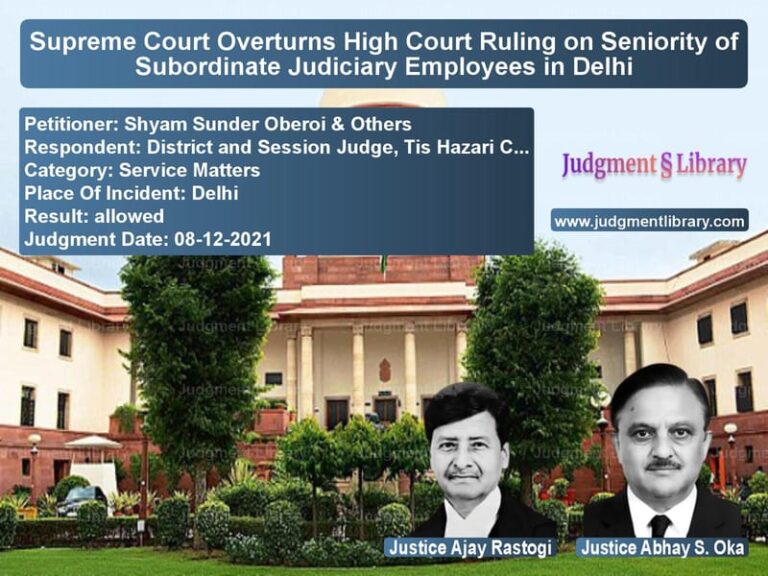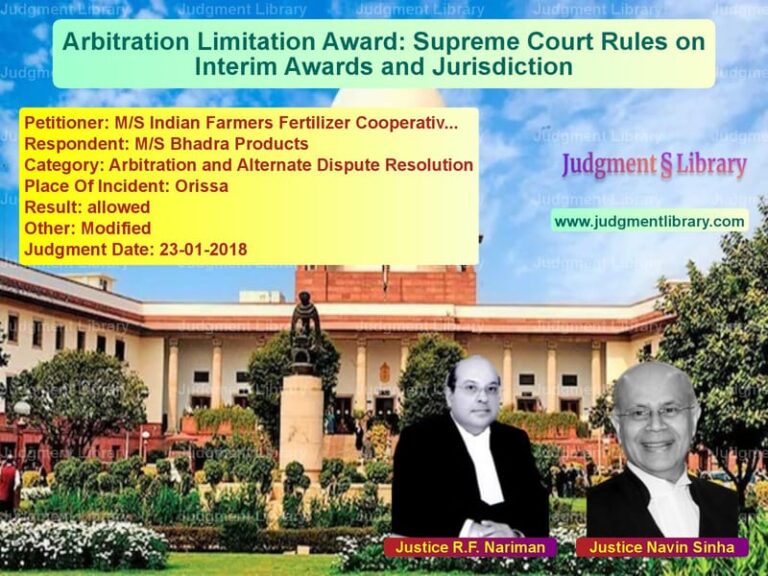Child Custody and Relocation: Supreme Court Allows Mother to Take Child Abroad
The case of Mrs. Ritika Sharan v. Mr. Sujoy Ghosh revolves around a legal dispute concerning child custody amid divorce proceedings. The Supreme Court was tasked with determining whether the mother, who had relocated to Singapore for employment, could take her minor child along with her despite the opposition from the father.
Background of the Case
The appellant, Mrs. Ritika Sharan, and the respondent, Mr. Sujoy Ghosh, were married on February 4, 2009. Their son, Sattik, was born on May 9, 2013. Over time, serious marital discord arose between the parties, and they started living separately in 2016.
In October 2016, the appellant filed for divorce under Section 13(1)(i-a) of the Hindu Marriage Act, 1955, citing cruelty by the respondent. Alongside, she filed a case under the Protection of Women from Domestic Violence Act, 2005. Meanwhile, the respondent sought custody of their child through multiple interim applications.
During the pendency of the divorce proceedings, the appellant was offered a job in Singapore and decided to relocate. She sought permission from the Family Court in Bengaluru to take the child with her. The court, however, denied her request, citing concerns over jurisdiction and the father’s right to visitation.
Key Legal Issues
The central issues before the Supreme Court were:
- Should the mother be allowed to relocate the child to Singapore while the divorce case is pending?
- Does the Family Court lose jurisdiction over a child if the child moves out of India?
- How should the father’s visitation rights be structured if the child moves abroad?
Arguments of the Petitioner
The petitioner (mother) presented the following arguments:
- She had been the primary caregiver since the child’s birth and had been responsible for his upbringing.
- The relocation to Singapore provided better employment opportunities, improved financial security, and superior educational facilities for the child.
- The father had been abusive and suffered from psychiatric conditions, making him unfit for custody.
- She was willing to facilitate visitation rights and had no intention of permanently severing the father-child relationship.
- The court’s refusal to allow the relocation was restricting her career and economic prospects, which in turn affected her ability to provide for the child.
Arguments of the Respondent
The respondent (father) strongly opposed the relocation and argued:
- The child had been residing with his maternal grandparents in Bengaluru, not the mother, and therefore she could not claim exclusive custody.
- Relocating the child to Singapore would lead to a breakdown in the father-child bond, depriving him of meaningful interaction.
- The mother had unilaterally decided to move without considering the emotional impact on the child.
- The legal proceedings, including the custody case, were pending in India, and allowing the mother to relocate would interfere with the judicial process.
- There was no guarantee that the mother would not relocate again after moving to Singapore, further complicating visitation.
Observations of the Supreme Court
1. The Welfare of the Child is Paramount
The Supreme Court emphasized that the child’s welfare is the most critical factor in custody disputes. It observed:
“The paramount objective must be to ensure the welfare of the child. The child has been in the care of the appellant since birth and has developed a strong emotional bond with the mother.”
The court noted that while the father had raised concerns about losing contact with the child, the child’s well-being took precedence over parental claims.
2. Jurisdiction of the Family Court
The Family Court had denied permission for relocation on the basis that it would lose jurisdiction over the child. The Supreme Court rejected this reasoning and stated:
“The Family Court’s jurisdiction is not lost merely because the child temporarily relocates to another country.”
The court clarified that even if the child moved to Singapore, the Indian courts retained jurisdiction over custody and visitation disputes.
3. Balancing Parental Rights
The court acknowledged that the father had a legitimate right to remain in contact with the child and ordered specific measures to facilitate this. It directed:
“The respondent shall have regular video calls with the child and in-person visits during school vacations.”
Final Judgment
The Supreme Court ruled in favor of the appellant and allowed her to take the child to Singapore, subject to the following conditions:
- The mother shall ensure that the child visits India at least twice a year.
- The father will have virtual visitation every weekend to maintain contact with the child.
- If the mother intends to relocate to a different country in the future, she must seek prior court approval.
- The father is entitled to physical visitation during the child’s school vacations.
Impact of the Judgment
This ruling has significant implications for child custody cases, particularly in situations where one parent wishes to relocate abroad. The judgment establishes that:
- The mother’s employment abroad does not disqualify her from custody.
- Relocation does not strip Indian courts of jurisdiction.
- Child custody decisions must be practical and child-centric, ensuring that both parents have an opportunity to maintain a meaningful relationship with the child.
- The non-custodial parent must be provided with reasonable access to maintain parental bonds.
Conclusion
The Supreme Court’s ruling in this case reinforces the principle that custody arrangements must be structured in a way that serves the best interests of the child while balancing the rights of both parents. The decision provides much-needed clarity on the legal framework governing child relocation and ensures that courts consider real-life implications rather than rigidly adhering to jurisdictional limitations.
Petitioner Name: Mrs. Ritika Sharan.Respondent Name: Mr. Sujoy Ghosh.Judgment By: Justice Dhananjaya Y Chandrachud, Justice Indu Malhotra, Justice Indira Banerjee.Place Of Incident: Bengaluru, Karnataka.Judgment Date: 28-10-2020.
Don’t miss out on the full details! Download the complete judgment in PDF format below and gain valuable insights instantly!
Download Judgment: Mrs. Ritika Sharan vs Mr. Sujoy Ghosh Supreme Court of India Judgment Dated 28-10-2020.pdf
Direct Downlaod Judgment: Direct downlaod this Judgment
See all petitions in Child Custody
See all petitions in Domestic Violence
See all petitions in Judgment by Dhananjaya Y Chandrachud
See all petitions in Judgment by Indu Malhotra
See all petitions in Judgment by Indira Banerjee
See all petitions in allowed
See all petitions in supreme court of India judgments October 2020
See all petitions in 2020 judgments
See all posts in Divorce Cases Category
See all allowed petitions in Divorce Cases Category
See all Dismissed petitions in Divorce Cases Category
See all partially allowed petitions in Divorce Cases Category







